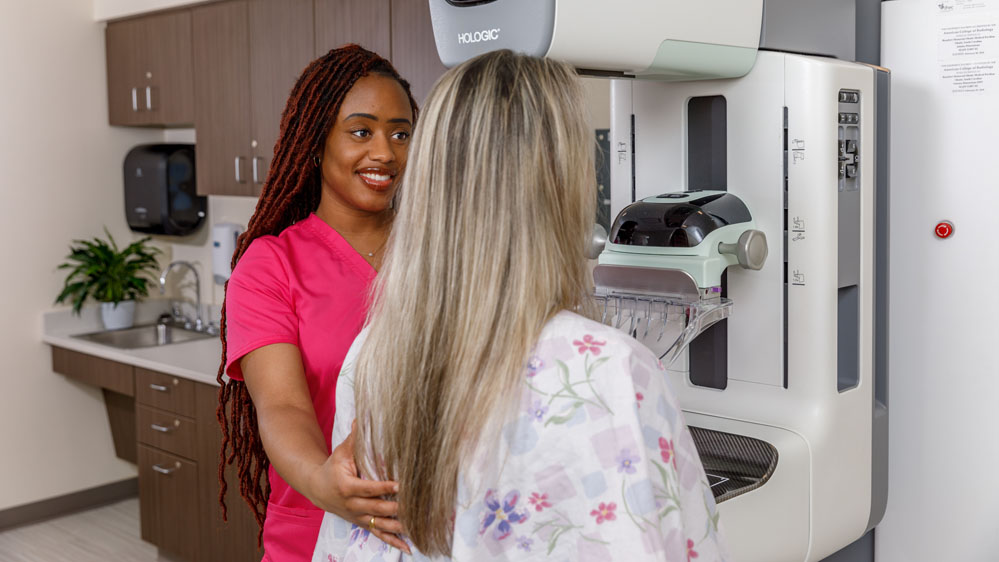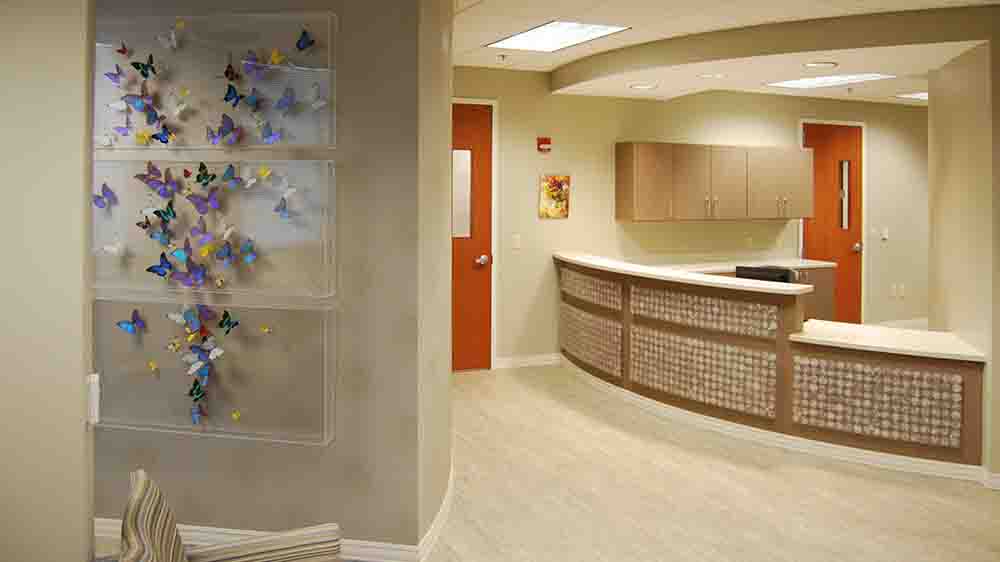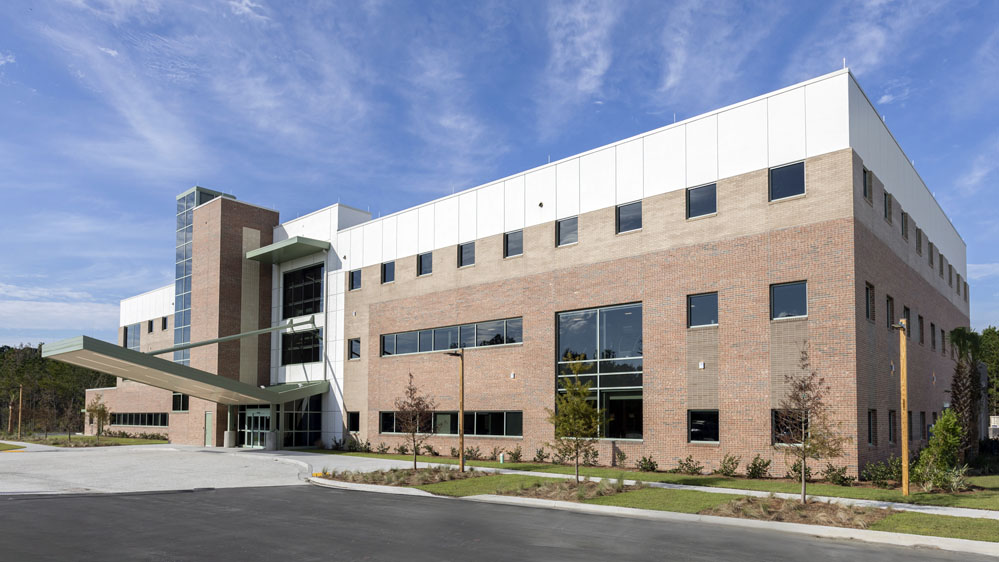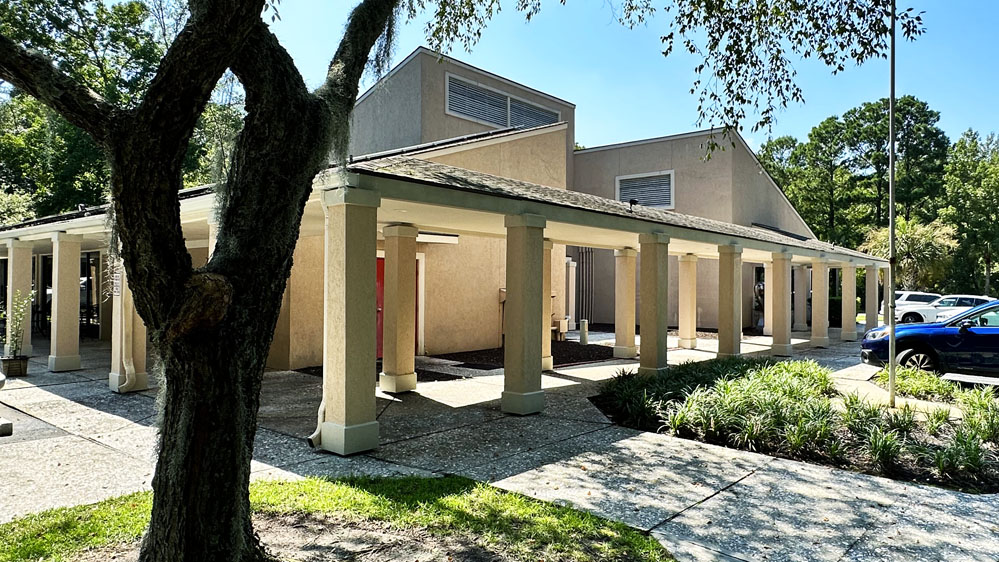Breast Health Centers
If you have breast pain or any other concern, finding the right breast health center is of the utmost importance. Treating breast concerns takes highly specialized knowledge as well as compassion and understanding.
At Beaufort Memorial, our nationally recognized Breast Health Centers provide a calm and relaxing atmosphere, as well as a comprehensive suite of breast care services. The centers are fully accredited by the American College of Radiology and National Accreditation Program for Breast Centers. You can rest assured that you are receiving quality care. Our teams of board-certified specialists use the latest technology and techniques for screenings, mammograms, consultations, as well as advanced treatments if they are needed.
If you are diagnosed with cancer, we’ll assign you a breast cancer navigator to help manage your appointments and provide education on your treatment plan as you move through the process.
Submit an appointment request online or call 843-522-5015 to schedule an appointment for your mammogram.
Screening mammograms do not require a physician referral, prescription or order.

Three Convenient Locations
Breast health is important to your overall well-being. That’s why Beaufort Memorial offers three convenient locations to women, so you can find breast care services close to home or work. To schedule an appointment in Beaufort , Hilton Head Island or Okatie, submit an appointment request online or call 843-522-5015.
Screening and Diagnostic Tools
We encourage women age 40 and older to get an annual mammogram, following the long-standing recommendations from the American College of Radiology and the American Society of Breast Surgeons. These screening tests are safe and have proven to be the most effective tool for finding breast cancer early.
Screening and diagnostic mammograms are types of X-rays that take images of your breasts so physicians can visualize tissue and see any abnormalities that may be too small to cause symptoms or be felt during a clinical breast exam.
A screening mammogram is a preventive measure based on your age or risk of breast cancer. During a screening mammogram, a mammography technologist captures images of all areas of the breasts. If something suspicious is spotted on your screening mammogram, the radiologist will likely recommend that you undergo a diagnostic mammogram.
A diagnostic mammogram focuses on specific areas of the breast and provides a more detailed X-ray of the breast using specialized techniques. Images from a diagnostic mammogram offer more detail than images from a screening mammogram.
Your provider may recommend a diagnostic mammogram if:
- You experience other signs of breast cancer, such as swelling, skin dimpling, breast pain, and nipple changes
- Your provider feels a lump during a clinical breast exam
Diagnostic mammograms are not considered preventive so coverage and out-of-pocket costs will vary depending on whether you have insurance and your specific insurance plan.
The Beaufort Memorial Breast Health Center offers 3D Mammography (Tomosynthesis). This technology takes several images of each breast from different angles and uses powerful C-View™ software to assemble them into a crystal-clear, three-dimensional picture. The approach is clinically proven to increase cancer detection and decrease false positives.
Automated Breast Ultrasound Screening (ABUS) is a noninvasive automated screening ultrasound performed in combination with an annual mammogram. ABUS uses high-frequency sound waves to generate more than 1,200 detailed images of the breast that are then compiled by a computer to give providers a comprehensive, 3D view of your breasts.
ABUS does not replace your annual mammogram, but your physician may recommend ABUS as a supplement to the exam if you have dense breasts.
To schedule an ABUS screening, you will need a referral from your OBGYN or primary care provider. ABUS is offered only at the Breast Health Center location in Beaufort.
Ultrasound is a painless, highly effective test to evaluate masses found on a screening mammogram or causes of new breast symptoms. Because ultrasound uses high-frequency sound waves—not radiation—it is commonly used in women younger than 30 years of age as the initial exam for breast symptoms.
If your mammogram or ABUS screening detects an abnormality, an ultrasound may be performed by an ultrasound technician and interpreted by a radiologist.
This noninvasive test uses a powerful magnetic field, radio frequency, and a computer to produce detailed images of the breast.
An MRI might be recommended for select women if their mammogram and ultrasound are abnormal, if they are at high risk of breast cancer, or have an existing diagnosis of breast cancer. MRI is offered only at the Beaufort and Okatie Breast Health Centers.
A core biopsy is performed using a small guided needle to obtain tissue for diagnosis. Beaufort Memorial specializes in stereotactic biopsy, MRI-guided biopsy, and ultrasound-guided biopsy—all offering faster and less invasive options compared with surgery, as well as highly accurate results. That means less stress for you.
If you are recommended for a biopsy, our imaging navigator will guide you through the process. The navigator will provide communication through your radiology team and provider.
If you are recommended to see a breast surgeon after the biopsy, the navigator will continue to guide you through the process.
What to Expect During Your Mammogram
Mammograms are basic imaging exams that require little preparation. However, a few steps can help make your mammogram more comfortable and accurate:
- Avoid scheduling your mammogram the week before your period, when your breasts are more tender.
- Wear a two-piece outfit to your exam, so you will need to remove only your top and bra for the test.
- Skip lotions and deodorant or antiperspirant. They can contain ingredients that may show up as white spots on images.
If you’re a new patient at the Breast Health Center, please request your films and records from your previous mammography provider and bring them with you to your appointment. Previous films and records are essential for an accurate interpretation of your mammogram, allow us to provide same-day results and can eliminate the need for additional testing.
Please complete this form, send it to your provider and have your films and records mailed directly to you, not to the Breast Health Center.
For a screening mammogram, a mammography technologist captures the images, and a radiologist reads them after the exam. If the radiologist has access to your prior films, your results will be provided the same day to you and your primary care provider or OBGYN.
During a diagnostic mammogram, the radiologist typically reviews the images of the breast tissue during the exam. This allows the specialist to determine in real-time if there is a need to capture more images of the breast with mammography or a different modality such as ultrasound or MRI. Based on what is revealed in the images, the radiologist may recommend a biopsy to determine if an abnormality is cancerous.
If your mammogram is normal and no additional follow-up is required, you’ll receive a reminder in the mail of when to schedule your next screening. We’ll provide your primary care provider with your results, too.
If an abnormality is seen on your mammogram or ultrasound during your appointment, a breast nurse navigator or radiologist will talk with you about your results and assist in scheduling any necessary appointments. Your nurse navigator will guide you through the process and answer your questions, both at the time of service and later.
If you plan to get a mammogram around the same time as when you get a COVID-19 vaccine, there are some things to consider.
As part of the normal immune system response to the vaccine, some women have experienced swollen lymph nodes. These enlarged lymph nodes can be an indicator of something more serious and can be detected in a screening mammogram.
To help avoid false positive results on mammograms, we recommend following the advice of the Society of Breast Imaging and Centers for Disease Control and prevention. If possible, and when it does not unduly delay care, consider scheduling screening mammograms before you receive a COVID-19 vaccine or wait to schedule your mammogram until four to six weeks after.
Women are encouraged to talk with their primary care providers prior to scheduling their mammogram if they have questions. You can also call the Breast Health Center at 843-522-7465.
All Affordable Care Act-compliant health insurance plans must cover annual screening mammograms every one to two years for women age 40 and older.
Medicare and Medicaid, as well as Cigna and many other private health insurance plans, also cover 3D mammograms, but not all plans do. If you’re unsure about your coverage, contact your insurance provider in advance to ask if 3D mammography and interpretation by a radiologist are covered, as those procedures are submitted and billed separately.
At Beaufort Memorial, we want women to get screened annually without having to worry about cost. Through our partnership with MDsave, we’re able to offer up to 60% off the cost of many common imaging procedures, including mammograms. Visit MDsave.com/SaveOnMammos for an up-to-date list of mammogram pricing. For women who meet income and other eligibility criteria, AccessHealth Lowcountry and Best Chance Network are able to assist with free routine screening mammograms.
Genetics + High Risk
Certain genes passed down in your family can increase your risk of breast cancer. About one in 10 breast cancers are hereditary. Based on guidelines from the National Comprehensive Cancer Network (NCCN), you may qualify for genetic screening and risk management. Speak with your primary care or women's health provider about your family medical history and the possible need for a referral to the Beaufort Memorial Breast Cancer Genetics and High-Risk Program. Appointments are available in Okatie.
Breast Cancer Treatment
If you are diagnosed with breast cancer, our NAPBC accredited Breast Care Program offers specialized services and cutting-edge treatment options, including:
- Breast surgery
- Chemotherapy
- Radiation therapy
- Clinical trials through the affiliation that our Keyserling Cancer Center has with the Medical University of South Carolina (MUSC Health)
Our certified breast care nurses, mammography and ultrasound technologists, and imaging navigators are available to answer questions and guide you through your services at the center.



